外研版高中英语高中英语必修二《Stage and screen》PartⅤ
- 格式:pptx
- 大小:1.68 MB
- 文档页数:12
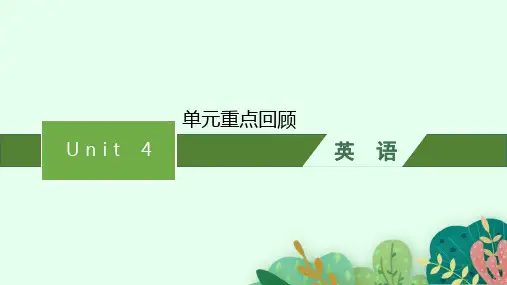
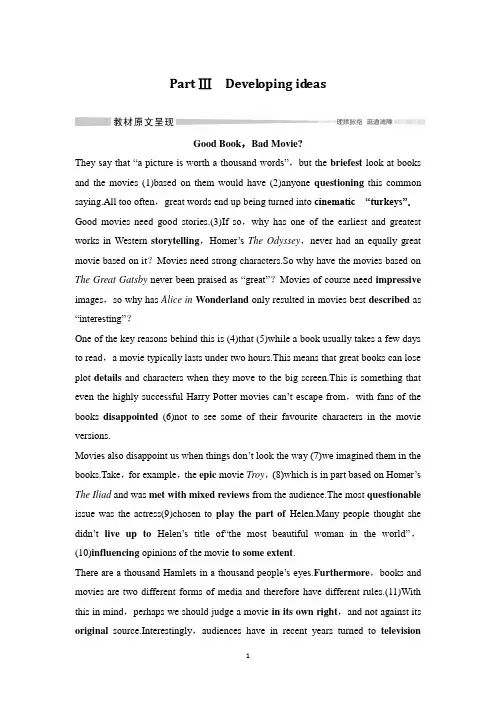
Part ⅢDeveloping id easGood Book,Bad Movie?They say that “a picture is worth a thousand words”,but the briefest look at books and the movies (1)based on them would have (2)anyone questioning this common saying.All too often,great words end up being turned into cinematic “turkeys”. Good movies need good stories.(3)If so,why has one of the earliest and greatest works in Western storytelling,Homer’s The Odyssey,never had an equally great movie based on it?Movies need strong characters.So why have the movies based on The Great Gatsby never been praised as “great”?Movies of course need impressive images,so why has Alice in Wonderland only resulted in movies best described as “interesting”?One of the key reasons behind this is (4)that (5)while a book usually takes a few days to read,a movie typically lasts under two hours.This means that great books can lose plot details and characters when they move to the big screen.This is something that even the highly succe ssful Harry Potter movies can’t escape from,with fans of the books disappointed(6)not to see some of their favourite characters in the movie versions.Movies also disappoint us when things don’t look the way (7)we imagined them in the books.Take,for example,the epic movie Troy,(8)which is in part based on Homer’s The Iliad and was met with mixed reviews from the audience.The most questionable issue was the actress(9)chosen to play the part of Helen.Many people thought she didn’t live up to Helen’s title of“the most beautiful woman in the world”,(10)influencing opinions of the movie to some extent.There are a thousand Hamlets in a thousand people’s eyes.Furthermore,books and movies are two different forms of media and therefore have different rules.(11)With this in mind,perhaps we should judge a movie in its own right,and not against its original source.Interestingly,audiences have in recent years turned to televisionseries such as Sherlock or Mad Men,which can have many characters and gradual plot development.Perhaps,one day,readers of F.Scott Fitzgerald’s most admired work will find themselves (12)glued to their screens by episodes of The Great Gatsby.(1)based on 是过去分词作定语修饰movies。
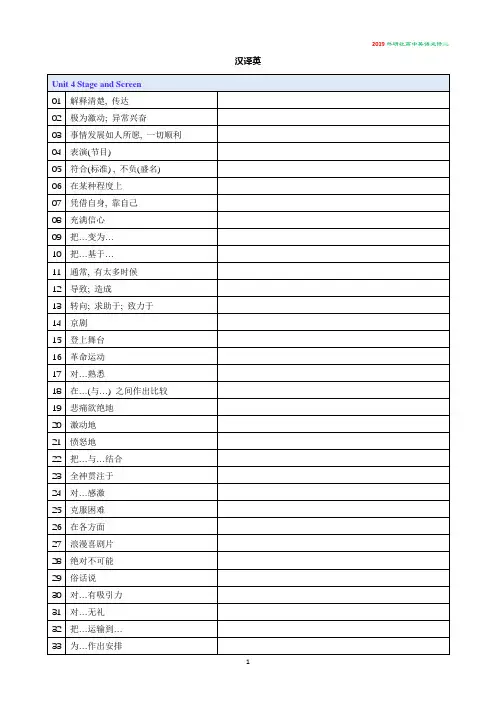
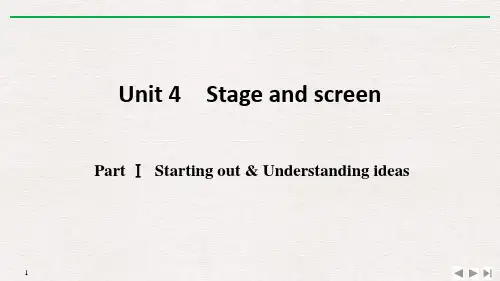
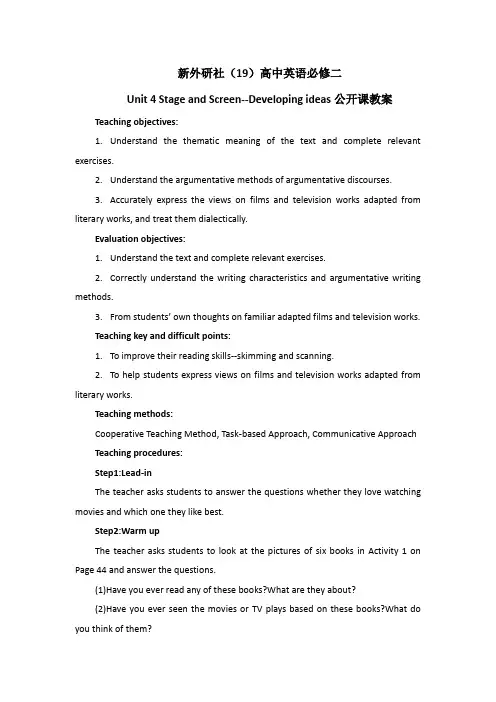
新外研社(19)高中英语必修二Unit 4 Stage and Screen--Developing ideas公开课教案Teaching objectives:1.Understand the thematic meaning of the text and complete relevant exercises.2.Understand the argumentative methods of argumentative discourses.3.Accurately express the views on films and television works adapted from literary works, and treat them dialectically.Evaluation objectives:1.Understand the text and complete relevant exercises.2.Correctly understand the writing characteristics and argumentative writing methods.3.From students’ own thoughts on familiar adapted films and television works.Teaching key and difficult points:1.To improve their reading skills--skimming and scanning.2.To help students express views on films and television works adapted from literary works.Teaching methods:Cooperative Teaching Method, Task-based Approach, Communicative Approach Teaching procedures:Step1:Lead-inThe teacher asks students to answer the questions whether they love watching movies and which one they like best.Step2:Warm upThe teacher asks students to look at the pictures of six books in Activity 1 on Page 44 and answer the questions.(1)Have you ever read any of these books?What are they about?(2)Have you ever seen the movies or TV plays based on these books?What do you think of them?Activity 2Skim the passage to fill in the blanks so as to get a general understanding of the whole passage.Main ideaPart 1 Problems Para.1The author puts forward a phenomenon that great words often 1.being turned into cinematic“turkeys”.Para.2Do good movies need good stories?Part 2 2.Para.3One of the reasons is that 3.and characters can be lost.Para.4Another reason is that things we expected may disappear in the movies.Part 3 Conclusion Para.5Come to a conclusion that we should judge a movie 4..Suggested answers:1.end up;2.Reasons;3.plot details;4.in its own rightActivity 31.Match the author’s opinions about the movie adaptations to the examples from the passage.(1)Some parts of the story and some characters are missing in the movie.(2)The visual images are not as striking as the descriptions in the book.(3)The movie is not as great as the book.(4)The movie doesn’t look the way we visualised while reading the book.(5)The characters do not stand out.(1)—a,(2)—d,(3)—c,(4)—e,(5)—b2.The teacher asks students to read“Learning to learn”on Page 45 to understand the functions of examples in argumentative essay.3.Read the passage carefully on Pages44-45 and choose the best answer.(1)What does the author want to talk about in this article?A.We shouldn’t judge a movie by the rules of its book version.B.Books are better than their movie versions.C.Movies have more impressed characters than books.D.Movies always make us disappointed.(2)What does the word “turkeys” mean in Paragraph 1?A.Success.B.Failures.C.Screen.D.Chicken.(3)What’s the function of Paragraph 2?A.To raise the readers’ cultural awareness.B.To prove good movies need good stories.C.To further confirm that good books always end up being turned into bad movies.D.To show that movies need impressive images.(4)From Paragraph 3,we can know that .A.reading a book is a waste of timeB.producing a film results in something important lost compared with the book versionC.a film only needs less than two hoursD.Harry Potter is a great success(5)Why do movies always disappoint us?A.Because they didn’t choose a good theme.B.Because they are often different from those in the books.C.Because they are badly performed.D.Because different audience have different views.(1)—(5) ABCBDLanguage points:1.They say that “a picture is worth a thousand words”,but the briefest look at books and the movies based on them would have anyone questioning this common saying.[句子翻译]__________________________________________________________★这是一个并列复合句。
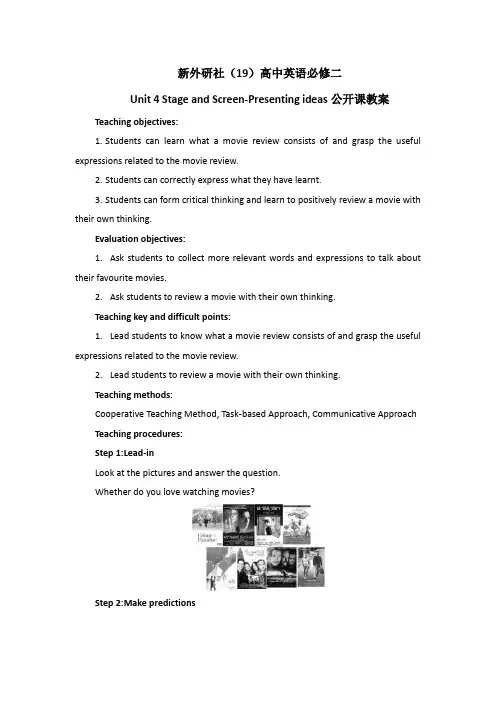
新外研社(19)高中英语必修二Unit 4 Stage and Screen-Presenting ideas公开课教案Teaching objectives:1.Students can learn what a movie review consists of and grasp the useful expressions related to the movie review.2.Students can correctly express what they have learnt.3.Students can form critical thinking and learn to positively review a movie with their own thinking.Evaluation objectives:1.Ask students to collect more relevant words and expressions to talk about their favourite movies.2.Ask students to review a movie with their own thinking.Teaching key and difficult points:1.Lead students to know what a movie review consists of and grasp the useful expressions related to the movie review.2.Lead students to review a movie with their own thinking.Teaching methods:Cooperative Teaching Method, Task-based Approach, Communicative Approach Teaching procedures:Step 1:Lead-inLook at the pictures and answer the question.Whether do you love watching movies?Step 2:Make predictionsAnswer the following questions1.What happened?2.How did it happen?Step3:Reading while thinkingActivity1:1.Read the movie review on Page 47 quickly and lead students to think about the following questions.(1).What is the movie about?(2).Who is the main character?(3).What is the most memorable scene in the movie?(4).What does the viewer think of the movie?2.Ask students to underline the key information while reading.When students ask questions, lead students to collect the useful expressions related to the movie review.Activity2:Lead students to read the movie review again and analyze its structure.Read again, and notice the structure of the movie review.Movie Review PartⅠ Paras1-3:Objective descriptions of the movie.PartⅠ Para.4:Subjective views on the movieStep4 BrainstormBrainstorm the useful expressions when reviewing a movie.General introduction:1.The film was directed by...2.The film tells us a real story.3.The film...directed by...is a story about...4.The film...is set in...5.The film is a love (romantic/moving) story.The most memorable scene:The most memorable scene is....Comments:1.对影片的积极评价①This is a very touching film.②...give an amazing performance in the film.③My favourite part of the film is...2.总结性评价或感想①I think it is well worth watching.②It is a wonderful/successful/moving/touching film.③From the simple but moving story,I’ve got a lot.Step 5:Show timeAsk students to talk about your favourite movies by using the expressions.Useful expressions:...is a ...movie but...The main character(s) is /are...The movie explores...The most memorable scene is...I (don’t) like the movie. I think it’s...Step 6:Present ideasAsk students to discuss with your classmates and try to recommend a performance to the class.The following types of TV programme will help you.Then complete the notes.Types of TV programmeHomework:Write a movie review of your favourite movie by using the expressions learnt within 100 words.。
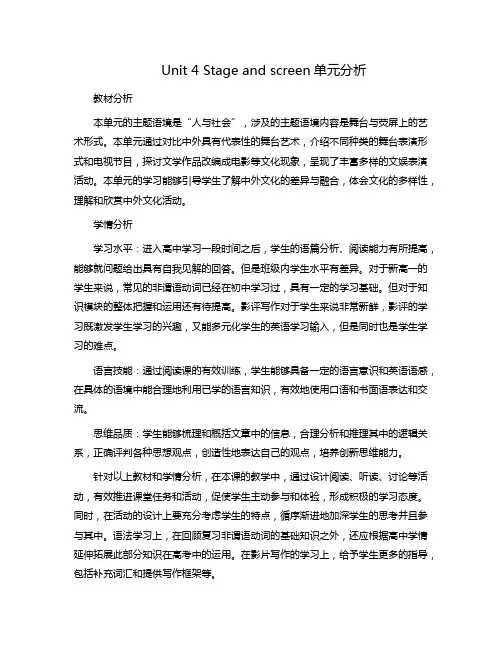
Unit 4 Stage and screen单元分析教材分析本单元的主题语境是“人与社会”,涉及的主题语境内容是舞台与荧屏上的艺术形式。
本单元通过对比中外具有代表性的舞台艺术,介绍不同种类的舞台表演形式和电视节目,探讨文学作品改编成电影等文化现象,呈现了丰富多样的文娱表演活动。
本单元的学习能够引导学生了解中外文化的差异与融合,体会文化的多样性,理解和欣赏中外文化活动。
学情分析学习水平:进入高中学习一段时间之后,学生的语篇分析、阅读能力有所提高,能够就问题给出具有自我见解的回答。
但是班级内学生水平有差异。
对于新高一的学生来说,常见的非谓语动词已经在初中学习过,具有一定的学习基础。
但对于知识模块的整体把握和运用还有待提高。
影评写作对于学生来说非常新鲜,影评的学习既激发学生学习的兴趣,又能多元化学生的英语学习输入,但是同时也是学生学习的难点。
语言技能:通过阅读课的有效训练,学生能够具备一定的语言意识和英语语感,在具体的语境中能合理地利用已学的语言知识,有效地使用口语和书面语表达和交流。
思维品质:学生能够梳理和概括文章中的信息,合理分析和推理其中的逻辑关系,正确评判各种思想观点,创造性地表达自己的观点,培养创新思维能力。
针对以上教材和学情分析,在本课的教学中,通过设计阅读、听读、讨论等活动,有效推进课堂任务和活动,促使学生主动参与和体验,形成积极的学习态度。
同时,在活动的设计上要充分考虑学生的特点,循序渐进地加深学生的思考并且参与其中。
语法学习上,在回顾复习非谓语动词的基础知识之外,还应根据高中学情延伸拓展此部分知识在高考中的运用。
在影片写作的学习上,给予学生更多的指导,包括补充词汇和提供写作框架等。
单元目标1.语言能力目标学生能够理解与文娱活动有关的文章内容,听懂并谈论与文娱活动有关的话题,使用新学语言谈论自己喜爱的电视节目;能够恰当使用现在分词作状语进行日常表达;能够写简单的影评。
2.文化意识目标学生能够了解中外文化的差异与融合,体会文化的多样性,理解和赏析中外文化活动。
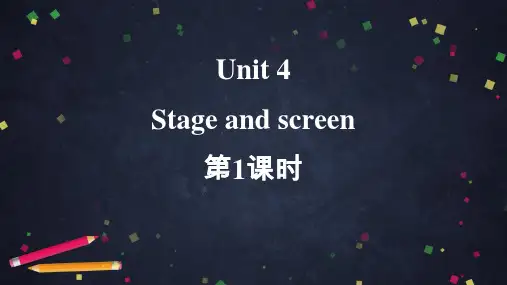
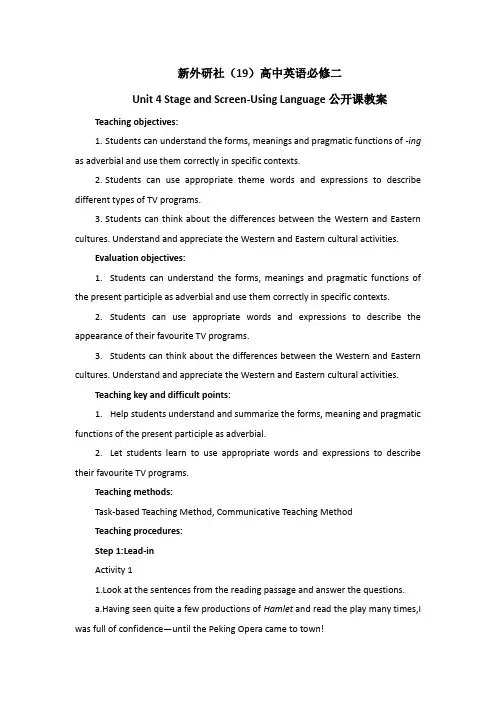
新外研社(19)高中英语必修二Unit 4 Stage and Screen-Using Language公开课教案Teaching objectives:1.Students can understand the forms, meanings and pragmatic functions of -ing as adverbial and use them correctly in specific contexts.2.Students can use appropriate theme words and expressions to describe different types of TV programs.3.Students can think about the differences between the Western and Eastern cultures. Understand and appreciate the Western and Eastern cultural activities.Evaluation objectives:1.Students can understand the forms, meanings and pragmatic functions of the present participle as adverbial and use them correctly in specific contexts.2.Students can use appropriate words and expressions to describe the appearance of their favourite TV programs.3.Students can think about the differences between the Western and Eastern cultures. Understand and appreciate the Western and Eastern cultural activities.Teaching key and difficult points:1.Help students understand and summarize the forms, meaning and pragmatic functions of the present participle as adverbial.2.Let students learn to use appropriate words and expressions to describe their favourite TV programs.Teaching methods:Task-based Teaching Method, Communicative Teaching MethodTeaching procedures:Step 1:Lead-inActivity 11.Look at the sentences from the reading passage and answer the questions.a.Having seen quite a few productions of Hamlet and read the play many times,I was full of confidence—until the Peking Opera came to town!b....seeing the main characters come on stage,I was surprised!(1)In sentence (a),who had seen quite a few productions of Hamlet and read the play many times?In sentence (b),who saw the main characters come on stage?(2)Is this structure used more often in spoken or written English?Suggested answers:(1)I.;I.(2)In written English.pare them with the following sentences and answer the questions.c.Since I had seen quite a few productions of Hamlet and read the play many times,I was full of confidence—until the Peking Opera came to town!d....when I saw the main characters come on stage,I was surprised!(3)What is the difference between the two groups of sentences?(4)Why does the author choose to use sentences (a) and (b) in the reading passage?Suggested answers:(3)The first group uses the present participle as adverbial while the second group uses adverbial clauses.(4)The sentences from the reading passage are more concise and formal.3.Now look for more sentences with this structure in the reading passage.Suggested answers:Dating back to the 18th century,Peking Opera has over two hundred years of history.Starting with an orchestra playing traditional Chinese instruments,the opera brought a completely new sound to my Western ears.Using such techniques,the opera had transformed a small stage into the whole universe.Feeling the strong emotions of love,anger,fear and grief in the performance,I could easily recognise the theme of Hamlet.Step2 Explanation of -ing as adverbial一、现在分词的基本形式1.现在分词的一般式,即doing。
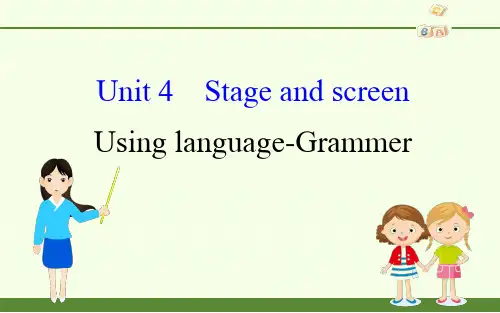
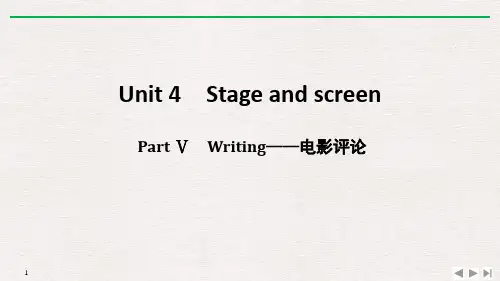
阅读教材P44—45中的材料,选出最佳选项1.What does “a picture is worth a thousand words” mean?A.The picture is very expensive.B.There are a thousand words in the picture.C.The picture is hard to describe in wordsD.The picture is rich in contents.2.Why some great works don't have an equally great movie?A.A book usually takes a few days to reaD.B.Some movies are not what people imagined in the books.C.Books have more imaginary scene.D.Books and movies are two different forms of mediA.3.What can we infer from this passage?A.Fewer and fewer people would like to read books.B.More and more people like to see films.C.Books that the good movies are based on may not be gooD.D.Audience are no longer to go to cinemA.4.What is the main idea of this passage?A.Books are good,movies are baD.B.Good books aren't necessary for good movies.C.Good books and good movies have different rules.D.Good books have no relation to good movies.[答案] 1—4DDCCWords and Phrases错误!absorbed adj.专心致志的(教材P41)As soon as the curtain rose,I was absorbed.幕一拉开,我就全神贯注了。
Unit4 Stage and screen单元考点解析【核心词汇短语】in_my_absence.我不在的时候,是秘书承担了我的责任。
②In_the_absence_of a will the courts decide who the guardian is.在没有遗嘱的情况下,由法庭指定监护人。
③She has_been_absent_from school for three days.她已经旷课3天了。
④His absence_of_mind nearly caused an accident.他的心不在焉差点引起一场事故。
I was_absorbed_in reading a book and didn't hear you call me.我当时正专心读书,没有听见你叫我。
②The first Chinese woman astronaut Liu Yang absorbed_the_whole_world's_attention.第一位中国女宇航员刘洋吸引了全世界人们的注意力。
名师点津表示“注意力集中于……”的还有:be devoted to,be lost in,concentrate on,focus on,be buried in,put one's heart into等。
I do not think jogging appeals_to me very much.我觉得我对慢跑不太感兴趣。
②If you appeal_to him for help, he will come down handsome.如果你向他求助,他会慷慨解囊的。
③She appealed_to the high court against her sentence.她不服判决而向高等法院上诉。
④The government is_appealing_to_everyone_to_save water.政府呼吁大家节约用水。